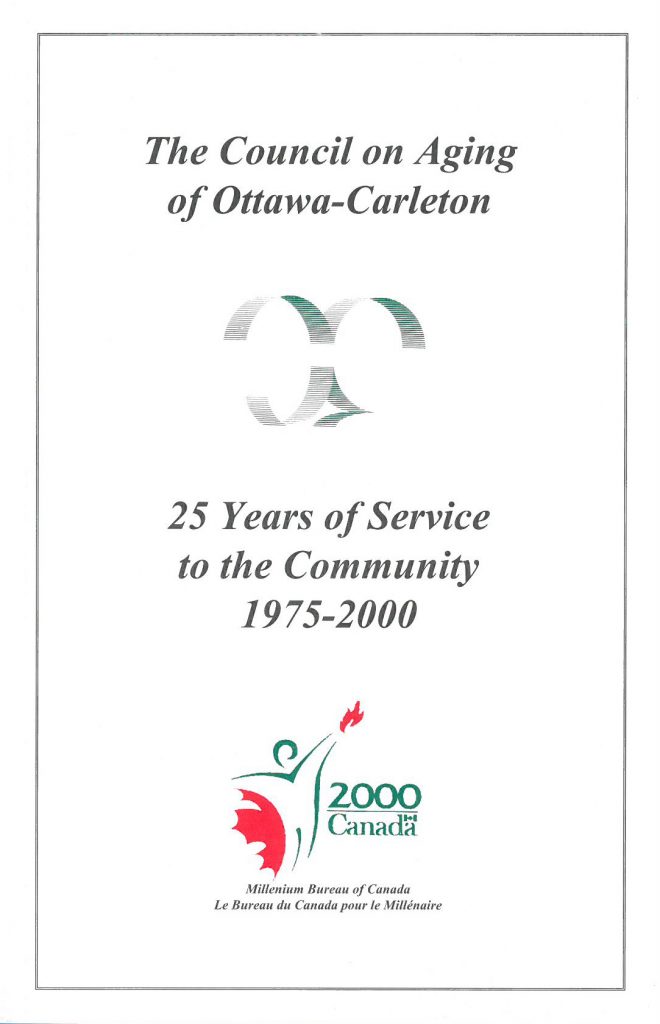
40 Years of History
In 1971 the forerunner of the Council on Aging emerged as a collaborative partnership between the Social Planning Council and the Senior Citizen’s Council with a broad agenda focussed on planning and coordinating services for seniors.

This partnership comprised senior citizens, representatives of health and social services, churches, housing agencies, funding bodies, as well as recreation and educational groups. The Council on Aging of Ottawa (COA) came into being in April 1975.
By 1985 the Council had become a source of planning expertise and guidance on seniors’ services. Working closely with the Social Planning Council and the District Health Council, the COA was at the forefront of the seniors’ movement in Ottawa, providing both information on seniors’ services and a forum to keep agencies and seniors working together.
In the early 90’s, provincial government policies started to focus on community health and social services for Ontario’s elderly. The Council responded by successfully coordinating seniors’ voices with agencies and the government. Stable core funding from the province, the region of Ottawa-Carleton, the City of Ottawa and United Way Ottawa was established.
The Council was incorporated as a legal entity in 1991 so that it could deal more effectively with complex and growing challenges. By 1994 there were 13 full- and part-time staff members managing 34 committees and task groups as well as the Board and several projects.
In 1996 a new political climate focused on fiscal restraint led to dramatic funding cuts to the Council. Significant changes in the social and political environment necessitated a change in direction. The size of the Board was reduced and the Council developed a broad membership. Standing committees were disbanded and replaced by time-limited working groups and task forces. The Council convened regular forums to remain responsive to the community. Only self-sustaining projects were undertaken.


By the fall of 1999, several projects were well underway and the Council was organizing and supporting multiple conferences and forums. Despite the difficult funding environment, the Council was surviving and growing in new directions. The Council celebrated its 25th anniversary in 2000 with pride and confidence in the future.
In 2001 the Council faced a new set of challenges with the amalgamation of 11 local governments into the City of Ottawa. The Council remained involved with major seniors’ issues, emphasizing the need to maintain and integrate city services. The City established several citizen-member advisory committees, including a Seniors Advisory Committee with representatives from both the Senior Citizens Council and the Council on Aging of Ottawa.
In 2003 the Council relocated to the Archdiocese building, benefiting from expanded space for meetings, conferences and forums, as well as a central location served by public transportation and free parking.
During the last decade community partnerships continued to grow, with committees formed to work on a variety of seniors’ issues such as elder abuse, transportation, housing and health. Communication and education became increasingly important. The Bulletin, the Council’s bilingual publication, focused on issues of concern and interest to seniors. It was printed 2-3 times each year, with up to 6,000 copies per issue distributed across the city by volunteers. In early 2010, a polished new format was introduced with the tag line: The Community Voice for Seniors. Furthermore, an ongoing series of Lunch & Learn events were organized in both English and French, with expert speakers invited to inform seniors, as well as their families and friends, about important topics.
In 2009 Age-Friendly Ottawa emerged as a collaborative effort between the Council, the City of Ottawa, community partners and seniors under the guidance of an AFO Steering Committee. The AFO Community Framework aims to make Ottawa a more age friendly community according to a model developed by the World Health Organization. Broadly speaking, AFO seeks to maximize opportunities for healthy and active aging among the growing and diverse population of seniors in Ottawa. To achieve its goals, AFO engaged seniors to identify and express their needs and priorities through a process of community consultation in 2011, leading to the development of an Age-Friendly Community Action Plan. In October 2012 the Council adopted An Age-Friendly Society as its overall strategic vision. Both the City of Ottawa and the Council and its partners continue to move forward with implementation of priority actions reflected in the City’s Older Adult Plan and the Age-Friendly Community Framework.




